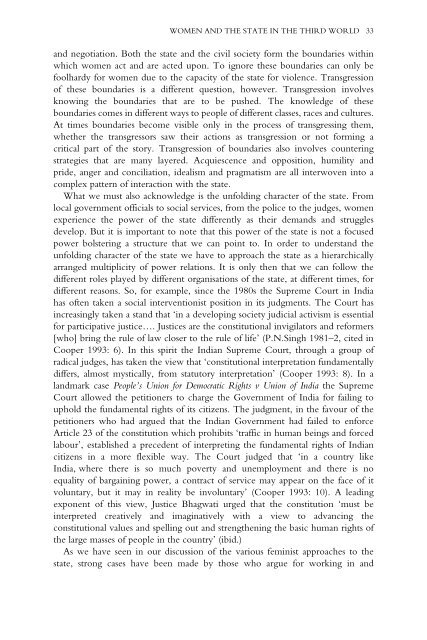Women and Politics in the Third World
Women and Politics in the Third World
Women and Politics in the Third World
Create successful ePaper yourself
Turn your PDF publications into a flip-book with our unique Google optimized e-Paper software.
WOMEN AND THE STATE IN THE THIRD WORLD 33<br />
<strong>and</strong> negotiation. Both <strong>the</strong> state <strong>and</strong> <strong>the</strong> civil society form <strong>the</strong> boundaries with<strong>in</strong><br />
which women act <strong>and</strong> are acted upon. To ignore <strong>the</strong>se boundaries can only be<br />
foolhardy for women due to <strong>the</strong> capacity of <strong>the</strong> state for violence. Transgression<br />
of <strong>the</strong>se boundaries is a different question, however. Transgression <strong>in</strong>volves<br />
know<strong>in</strong>g <strong>the</strong> boundaries that are to be pushed. The knowledge of <strong>the</strong>se<br />
boundaries comes <strong>in</strong> different ways to people of different classes, races <strong>and</strong> cultures.<br />
At times boundaries become visible only <strong>in</strong> <strong>the</strong> process of transgress<strong>in</strong>g <strong>the</strong>m,<br />
whe<strong>the</strong>r <strong>the</strong> transgressors saw <strong>the</strong>ir actions as transgression or not form<strong>in</strong>g a<br />
critical part of <strong>the</strong> story. Transgression of boundaries also <strong>in</strong>volves counter<strong>in</strong>g<br />
strategies that are many layered. Acquiescence <strong>and</strong> opposition, humility <strong>and</strong><br />
pride, anger <strong>and</strong> conciliation, idealism <strong>and</strong> pragmatism are all <strong>in</strong>terwoven <strong>in</strong>to a<br />
complex pattern of <strong>in</strong>teraction with <strong>the</strong> state.<br />
What we must also acknowledge is <strong>the</strong> unfold<strong>in</strong>g character of <strong>the</strong> state. From<br />
local government officials to social services, from <strong>the</strong> police to <strong>the</strong> judges, women<br />
experience <strong>the</strong> power of <strong>the</strong> state differently as <strong>the</strong>ir dem<strong>and</strong>s <strong>and</strong> struggles<br />
develop. But it is important to note that this power of <strong>the</strong> state is not a focused<br />
power bolster<strong>in</strong>g a structure that we can po<strong>in</strong>t to. In order to underst<strong>and</strong> <strong>the</strong><br />
unfold<strong>in</strong>g character of <strong>the</strong> state we have to approach <strong>the</strong> state as a hierarchically<br />
arranged multiplicity of power relations. It is only <strong>the</strong>n that we can follow <strong>the</strong><br />
different roles played by different organisations of <strong>the</strong> state, at different times, for<br />
different reasons. So, for example, s<strong>in</strong>ce <strong>the</strong> 1980s <strong>the</strong> Supreme Court <strong>in</strong> India<br />
has often taken a social <strong>in</strong>terventionist position <strong>in</strong> its judgments. The Court has<br />
<strong>in</strong>creas<strong>in</strong>gly taken a st<strong>and</strong> that ‘<strong>in</strong> a develop<strong>in</strong>g society judicial activism is essential<br />
for participative justice…. Justices are <strong>the</strong> constitutional <strong>in</strong>vigilators <strong>and</strong> reformers<br />
[who] br<strong>in</strong>g <strong>the</strong> rule of law closer to <strong>the</strong> rule of life’ (P.N.S<strong>in</strong>gh 1981–2, cited <strong>in</strong><br />
Cooper 1993: 6). In this spirit <strong>the</strong> Indian Supreme Court, through a group of<br />
radical judges, has taken <strong>the</strong> view that ‘constitutional <strong>in</strong>terpretation fundamentally<br />
differs, almost mystically, from statutory <strong>in</strong>terpretation’ (Cooper 1993: 8). In a<br />
l<strong>and</strong>mark case People’s Union for Democratic Rights v Union of India <strong>the</strong> Supreme<br />
Court allowed <strong>the</strong> petitioners to charge <strong>the</strong> Government of India for fail<strong>in</strong>g to<br />
uphold <strong>the</strong> fundamental rights of its citizens. The judgment, <strong>in</strong> <strong>the</strong> favour of <strong>the</strong><br />
petitioners who had argued that <strong>the</strong> Indian Government had failed to enforce<br />
Article 23 of <strong>the</strong> constitution which prohibits ‘traffic <strong>in</strong> human be<strong>in</strong>gs <strong>and</strong> forced<br />
labour’, established a precedent of <strong>in</strong>terpret<strong>in</strong>g <strong>the</strong> fundamental rights of Indian<br />
citizens <strong>in</strong> a more flexible way. The Court judged that ‘<strong>in</strong> a country like<br />
India, where <strong>the</strong>re is so much poverty <strong>and</strong> unemployment <strong>and</strong> <strong>the</strong>re is no<br />
equality of barga<strong>in</strong><strong>in</strong>g power, a contract of service may appear on <strong>the</strong> face of it<br />
voluntary, but it may <strong>in</strong> reality be <strong>in</strong>voluntary’ (Cooper 1993: 10). A lead<strong>in</strong>g<br />
exponent of this view, Justice Bhagwati urged that <strong>the</strong> constitution ‘must be<br />
<strong>in</strong>terpreted creatively <strong>and</strong> imag<strong>in</strong>atively with a view to advanc<strong>in</strong>g <strong>the</strong><br />
constitutional values <strong>and</strong> spell<strong>in</strong>g out <strong>and</strong> streng<strong>the</strong>n<strong>in</strong>g <strong>the</strong> basic human rights of<br />
<strong>the</strong> large masses of people <strong>in</strong> <strong>the</strong> country’ (ibid.)<br />
As we have seen <strong>in</strong> our discussion of <strong>the</strong> various fem<strong>in</strong>ist approaches to <strong>the</strong><br />
state, strong cases have been made by those who argue for work<strong>in</strong>g <strong>in</strong> <strong>and</strong>




